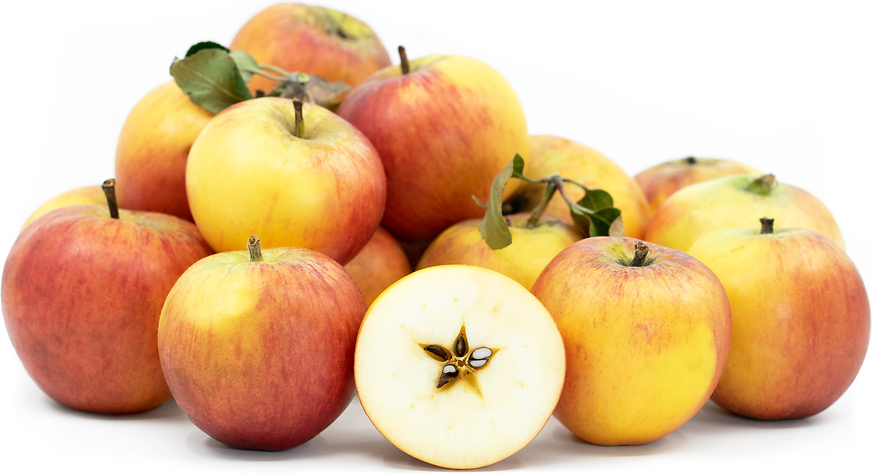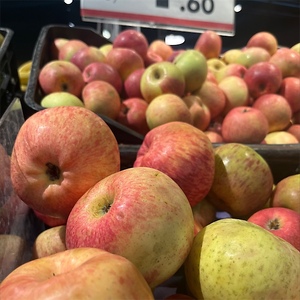


Baker's Delicious Apples
Estimated Inventory, 1 Lb : 0
Description/Taste
Baker’s Delicious apples are a small to medium varietal, averaging 6 to 7 centimeters in diameter, and have a round, ovate, to slightly conical shape. The apples sometimes display an irregular, lopsided appearance, and the skin is matte, smooth, and thin, easily punctured with light pressure. The skin also has a pale yellow to golden base hue, covered in patches, stripes, and striations of bright orange-red blush and russet. Underneath the surface, the cream-colored flesh is aqueous, semi-grainy, and soft, encasing a medium-sized core filled with small brown seeds. Baker’s Delicious apples contain high sugar and acid content, contributing to the cultivar’s balanced, sweet-tart flavor with aromatic, wine-like undertones.
Seasons/Availability
Baker’s Delicious apples are available in the late summer through early fall.
Current Facts
Baker’s Delicious apples, botanically classified as Malus domestica, are an heirloom variety belonging to the Rosaceae family. The aromatic cultivar was released in the early 20th century and is a second early variety favored for its complex, balanced flavor. Baker’s Delicious apples were primarily cultivated as a dessert apple, consumed immediately after harvest. Early apple varieties were historically an essential category of apples in England as they were the first to ripen, were less susceptible to disease, and produced fruits before the dangers of frost. Over time, many of these early cultivars were removed from commercial production due to their short shelf life and delicate nature and were replaced by more hardy varieties. In the modern-day, Baker’s Delicious apples are a rare cultivar only found through a few growers throughout the United Kingdom and are sold locally to heirloom apple enthusiasts.
Nutritional Value
Baker’s Delicious apples are a good source of fiber to regulate the digestive tract and potassium to balance the fluid levels within the body. The apples also provide vitamin C to strengthen the immune system, vitamin A to maintain healthy organ functioning, iron to develop the protein hemoglobin for oxygen transport through the bloodstream, and other amounts of phosphorus, manganese, calcium, and boron.
Applications
Baker’s Delicious apples have a rich, sweet, and sour flavor well suited for fresh preparations. The apples are primarily consumed straight, out of hand, and are appreciated for their soft and delicate consistency. Baker’s Delicious apples can also be sliced and served on appetizer platters, tossed into salads, or used as a fresh topping over porridge, cereal, pancakes, and waffles. Beyond raw applications, Baker’s Delicious apples are sometimes incorporated into tarts, crumbles, and pies or simmered into jams, jellies, and sauces. Despite their “baker” moniker, the variety was named after a nursery in England and was not given this descriptor for its ability to shine in various cooked preparations. Baker’s Delicious apples pair well with spices such as cinnamon, nutmeg, and cloves, vanilla, caramel, cheeses such as gouda, brie, cream, and camembert, and herbs including parsley, mint, and sage. Whole, unwashed Baker’s Delicious apples are fragile and can be punctured or bruised easily. The apples should be handled with care and consumed immediately for the best quality and flavor. Depending on storage conditions, the variety may be kept for 1 to 3 days, but if handled or damaged, the apples can begin to rot overnight.
Ethnic/Cultural Info
In Wolverhampton, a city in Central England, there are over 52 varieties of 18th and 19th-century apples planted at Wightwick Manor, a famous Victorian house that was built in the style of the aesthetic movement. The manor was initially the family home of Theodore Mander, a successful industrialist, who constructed the house in 1887, later extending its size in 1893. In the early 1900s, Geoffrey Mander, the son of Theodore, inherited the manor and connected with the National Trust to deem whether the house was a site worth preserving. The National Trust, one of Europe’s largest conservation charities that protects and cares for historic properties, accepted the property in 1937 and continues to allow public tours of the house and gardens into the present day. Wolverhampton was also the first city in England where Baker’s Delicious apples were released commercially. Wightwick Manor has collected rare apple varieties, rumored to include Baker’s Delicious, and the gardens have three orchards that produce apples, pears, cherries, medlar, and plums. The orchards were initially established to provide fruits to feed the manor and the manor’s staff, but now the orchards are a historical site meant to preserve the heirloom apple varieties. In one of the orchards, there is even an apple tree with twelve different apple varieties grafted onto the tree's base. The unique tree produces fruits each year and is a favored stop on the Wightwick Manor tour.
Geography/History
Baker’s Delicious apples are native to Wales and are an heirloom variety, though the exact date of origin is unknown. The cultivar was commercially introduced in 1932 by Baker’s Nurseries, located in Codsall near Wolverhampton, England. Baker’s Nurseries was a famous business throughout Central England in the early 20th century, and many Codsall residents worked for the nursery, cultivating seedlings and seed packing. The nursery closed for business in the 1960s, and after its closing, Baker’s Delicious fell into obscurity and has become a rare variety. Today Baker’s Delicious apples are found through specialty growers in the United Kingdom and are sold in limited quantities through farm stands, local markets, and family grocers. The variety can also be seen in some home gardens and private orchards in England.








